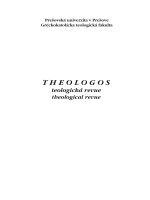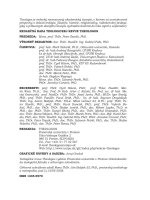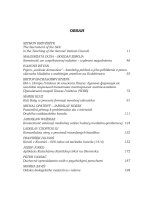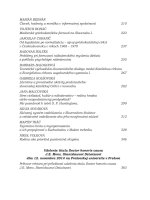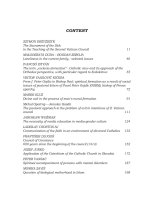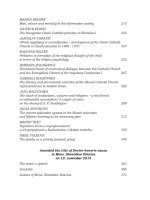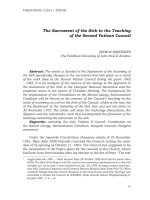From f peter gojdic to bishop paul spiri (1) 19
Bạn đang xem bản rút gọn của tài liệu. Xem và tải ngay bản đầy đủ của tài liệu tại đây (194.37 KB, 1 trang )
THEOLOGOS 1/2015 | ŠTÚDIE
The Sacrament of the Sick according to the Constitution
on the Sacred Liturgy Sacrosanctum Concilium 73 – 75
After the opening of the session on 11 October 1962 a number of
committees were established to deal with individual cases. In the case
of the Sacrament of the Anointing of the Sick it was the Liturgical Commission, chaired by Cardinal. A. Larraona († 1973). The committee, due
to the immensity of the work, was divided into thirteen subcommittees.
The matter of de sacramentis et sacramentalibus was addressed by the
eighth subcommittee23, chaired by the Archbishop. P. Hallinan († 1968).
The composition of both the Commission and the eighth Subcommittee
included the Polish Bishop Franciszek Jop († 1976).
The subcommittee took the material that had been produced by the
Preparatory Commission of the Council. The content of the material under
the numbers 57 to 60 were recorded postulates regarding the Sacrament
of the Anointing of the Sick. After a two-fold consideration of these four
points, they were adopted at the plenary meeting of the Liturgical Commission held in late April and early May 1963. The newly developed points
were read in Latin by Fr. Stefanski24:
57. Extreme unction, which may also and more fittingly be called
Unctio infirmorum, is not a sacrament for those only who are at the
point of death. Hence, as soon as any one of the faithful begins to
be in danger of death from sickness or old age (senium), the fitting
time for him to receive this sacrament has certainly (certe) already
arrived.
58. In addition to the separate rites for anointing of the sick and for
viaticum, a continuous rite shall be prepared according to which the
sick man is anointed after he has made his confession and before he
receives viaticum.
59. The number of the anointings is to be adapted to the occasion, and the prayers which belong to the rite of anointing are to be
revised so as to correspond with the varying conditions of the sick
who receive the sacrament.
As to point 60, which read: „the sacred anointing can sometimes be
repeated during the course of a long term illness,“ the Commission put
forth the postulate to omit the entire point due to a legitimate reason presented during the meeting. The reason was that the wording of point 57,
23
24
For more on the Liturgical Commission, its division, and procedures see: R. WILTGEN,
Ren wpada do Tybru. Historia Soboru Watykańskiego II, Poznań 2001, s. 79 – 82.
cf. J. STEFAŃSKI, Sakrament..., s. 37 – 39.
19
